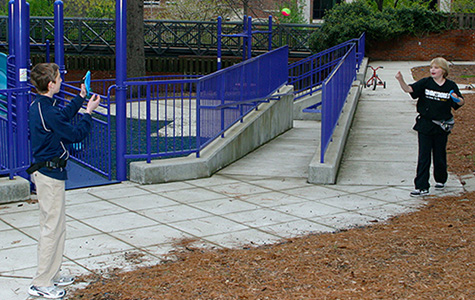Vanderbilt Kennedy Center (TN UCEDD) Researchers Find Face Memory Predicts Social Engagement in Children With and Without Autism
October 31, 2014

|
Vanderbilt Kennedy Center (TN UCEDD) Researchers Find Face Memory Predicts Social Engagement in Children With and Without Autism Vanderbilt Kennedy Center (TN UCEDD) Researchers have found that face memory strongly predicts social engagement in both children with and without autism spectrum disorder (ASD). Blythe Corbett, Ph.D., lead author of the report published in the Journal of Neurodevelopmental Disorders (2014, 6:35), led the study of 34 children with ASD and 32 typically developing children, all boys ages 8 to 12 years.
Corbett is associate professor of Psychiatry. Researchers used neuropsychological measures of face processing to test children's ability to recognize emotions in facial expressions (e.g., fear) and to remember faces. "Previous studies using neuropsychological measures have linked the ability to identify and to remember facial information with social deficits in children with ASD,"Corbett said. "Yet the extent to which these measures are predictive of real-world social behavior is not clear. In this study, we were able to test that by using neuropsychological measures of face processing and also observing children in a playground paradigm with peers." Corbett developed the Peer Interaction Paradigm to examine social exchanges occurring among children with and without ASD within a playground environment. The 20-minute paradigm includes periods of free play and opportunities for cooperative play that are facilitated by a typically developing confederate child of the same age and gender with a child with ASD and a typically developing peer. Cameras on the playground record the interactions while researchers observe from a behavioral lab, so that the play among the children is natural.
The researchers found that face memory strongly predicted social engagement in both groups of children. Impairment in face memory was associated with reduced 'real world' social interaction and more isolated play. In contrast, higher performance in face memory predicted more cooperative play. "Our findings show that face memory and reciprocal social interaction are strongly connected," Corbett said. "This suggests that improvement in one may benefit the other, which has implications for treatments."Corbett has developed a theatre-based research intervention, SENSE Theatre, to improve the social and emotional functioning of children with ASD. Participants with ASD are paired with typically developing peers who serve as expert models. Findings from SENSE Theatre research indicate that the intervention results in significant improvement in face memory as well as gains in social skills. Co-authors of the study "Examining the relationship between face processing and social interaction behavior in children with and without autism spectrum disorder" were Cassandra Newsom (Pediatrics), Alexandra Key (Hearing & Speech Sciences), Lydia Qualls (Psychiatry), and E. Kale Edmiston (Vanderbilt Brain Institute). For more information, see S.E.N.S.E. Lab. http://kc.vanderbilt.edu/senselab/







